Rachel Neumeier's Blog, page 299
June 19, 2016
Great dads in SFF
Happy Father’s Day to all the dads out there! In a minute I need to go ice my dad’s favorite cookies, but first let me draw your attention to this post at Barnes and Noble, about great dad moments in SFF.
My favorite of their examples is the one where Aral Vorkosigan saves Miles by getting the collected-an-army charge altered to the more serious charge of treason. Aral was a great father all the way through the series, too.
Here’s another post, this one at tor.com. I don’t totally agree with picking out father figures like Giles from Buffy The Vampire Slayer, but on the other hand, this post does depart from SFF enough to point directly at my favorite fictional father of all time: Keith Mars from the Veronica Mars series. I love Keith in that series and I was totally going to mention him if tor.com hadn’t beaten me to it.

Fathers in my own books tend to have rather fraught relationships with their children. Let me see. We have:
In The City in the Lake, we have some of my favorite fathers as secondary characters — Timou’s father Kapoen; and Neill and Cassiel’s father, Drustan. They are both seriously flawed men, of course, but I am very fond of them both.
In the Griffin Mage trilogy, we never hear about Kes’ father, and though we never meet Bertaud’s father, he was obviously a pretty unpleasant man. Mienthe’s father was horrible, though of course not much on stage either. But Tehre’s father, Eben Amnachudran, is another of my favorites among my secondary characters. The Kings of Feierbiand and Casmantium are also fathers, though we don’t see a lot of them in that role.
You remember Prince Tepres’ father in House of Shadows? Geriodde Seriantes? Yeah, talk about a fraught relationship. Pretty rough on them both, actually. In fact, I focused quite a bit on the relationship between Tepres and his father in the sequel, which of course I am determined that you will all get a chance to read *someday.*
In Black Dog, Grayson is everyone’s father figure, though no one’s actual father.
Nothing complicated about the father-daughter relationship in The Keeper of the Mist. Poor Keri. I hope few of us have fathers as selfish and short-sighted as hers.
In the forthcoming The Mountain of Kept Memory, Oressa and Gulien’s father, King Osir is . . . complicated. Not exactly likeable. In fact, not likeable at all, except that I admit I kind of like him, but then I know more about Osir from the beginning than the reader can. Oressa and Gulien have very different relationships with their father, I will say that, and neither of them is exactly objective. So that invites the reader to maybe be not quite sure about Osir until the very end. Maybe not then. I’ll be interested in seeing how readers respond to him.
I guess I would say that I have five fathers who are basically decent people and try to be good fathers, and three — four, I guess — who are not the kind of men you’d want as a father. I’m leaving out Geriodde Seriantes because it’s not really fair to judge him without reading the sequel first.
Okay, who’s your favorite father in SFF? Or in general fiction?
Since B&N mentioned Aral Vorkosigan and tor.com mentioned Keith Mars, my favorites are taken care of, but I bet I’m forgetting someone. Oh, of course I am — Griffin Tourmalyne in McKillip’s Song for the Basilisk. And come to think of it, Arioso Pellior, in the same book, is one of the scariest fathers ever. Who would you all pick as either a great father or a scary father?

June 18, 2016
Let’s see how that works out for you
Here at tor.com, Joe Zieja cheerfully announces that he’s going to take a stab at summarizing five books based solely on their covers and titles. That’s a lot like people-watching at an airport or something and making up stories about the people you see, isn’t it? Except possibly funnier. Definitely no more likely to be accurate.
Let’s see, looks like Zieja has chosen:
The Grace of Kings by Ken Liu
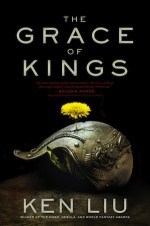
Twelve Kings of Sharakhai by Bradley P. Beaulieu
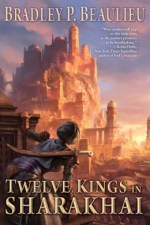
Duskfall by Christopher Husberg
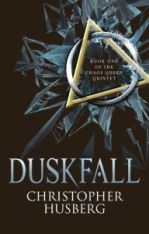
Signal to Noise by Silvia Moreno-Garcia
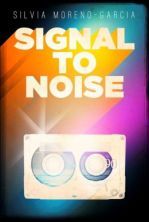
And The Traitor Baru Cormorant by Seth Dickinson — ooh, great choice, that title is sure suggestive. Not necessarily in a good way; this particular title is a turn off for me. Let’s see what Zieja guesses about this book given the cover:
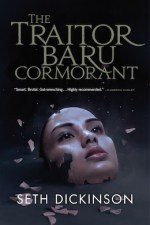
And here we go: “In this incredible book by Mr. Dickenson, who is, if you haven’t decoded this yet, Charles Dickens’ SON (DickenSON—get it?) we follow a blind mime through a passionate journey to reclaim the lost porcelain doll of his childhood. Only, since this is a fantasy novel, the porcelain doll is actually a magical familiar. The blind mime has been a wizard since birth, but never knew about it because he was raised by a baru—an extinct Australian crocodile—and a cormorant, which sort of also explains the mime thing. Since animals can’t talk. Right?”
Uh huh, I’m sure that’s close. Let’s see what Goodreads says, just out of curiosity:
THE TRAITOR BARU CORMORANT is an epic geopolitical fantasy about one woman’s mission to tear down an empire by learning how to rule it.
Tomorrow, on the beach, Baru Cormorant will look up from the sand of her home and see red sails on the horizon.
The Empire of Masks is coming, armed with coin and ink, doctrine and compass, soap and lies. They’ll conquer Baru’s island, rewrite her culture, criminalize her customs, and dispose of one of her fathers. But Baru is patient. She’ll swallow her hate, prove her talent, and join the Masquerade. She will learn the secrets of empire. She’ll be exactly what they need. And she’ll claw her way high enough up the rungs of power to set her people free.
Well, that doesn’t sound like a great book for me, especially with the creepy broken-doll cover.
Okay, of the five books here: I like the cover of Twelve Kings best. Here’s a post about that cover:
Paquette is one of my favourite artist, particularly for his work on Magic: The Gathering, and produces some of the best landscapes and cityscapes in the business. I also love that Çeda is front-and-centre on the cover, but doesn’t succumb to the traditional tropes that cover artists use to cue readers to her gender. She’s feminine, but not over-sexualized, and that sword looks like it can do some damage (though, Çeda’s no chump with just her fists!)
Actually, at the smaller size at which I first saw this cover, I didn’t realize the figure was a woman. Well, at the larger size, it’s obvious. I definitely prefer ambiguity to little bikini outfits.

June 17, 2016
Something to look forward to
Hey, I just noticed that Sharon Shinn’s 4th Elemental Blessings book is scheduled to come out this year. Cool!
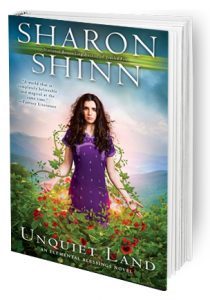
Remember Leah from JEWELED FIRE? This is evidently her book. The description at Shinn’s website says:
Leah Frothen has spent five years in self-imposed exile, recovering from a failed relationship and hating herself for abandoning her baby daughter. Now she’s back in Welce, determined to find her place in society and learn to be a mother to her little girl. Life quickly becomes complicated when the regent asks her to spy on mysterious ambassadors from a visiting nation and when an old friend unexpectedly shows up, wrestling with demons from his own past. Leah finds herself developing a dangerous friendship with an unscrupulous foreign woman and falling in love with a man she’s not even sure she can trust. And soon she learns that everyone—her regent, her lover, and even her daughter—have secrets that could save the nation, but might very well break her heart.
I love this series, and this installment sounds good. I will undoubtedly re-read JEWELED FIRE before this new UNQUIET LAND. Probably not the first two, though. I remember them really well by now.

Hugo Voting: the easy categories
This year I’m finding several categories where there seems to be one clear standout nominee that goes first and the rest of the nominees can just be piled in a heap below my top pick.
Here are the categories that have been the easiest to vote in for me this year:
Best fan writer
1. Shamus Young. I just dipped into this nominated entry here and there, probably reading no more than 10% of the text. But this huge labor-of-love analysis of the video game series Mass Effect is quite impressive. I read enough of it to see that Young makes good on his statement that he goes beyond a cursory examination of plot holes to discuss story structure and how people connect to stories, which is just the sort of analysis I like. His actual writing is good, too. Plus Young went to a lot of trouble to reformat this 300+ page work to make it more reader-friendly for the Hugo voter’s packet, which a good many nominees don’t appear to have made any effort to do. I did take a look at the other nominees, but Young’s work is imo clearly the most impressive – so clearly that I’m inclined to leave the rest of the category blank.
Alas, now I kind of want to try the games, but honestly, I don’t have time for another hobby, so that is not helpful.
I might put Mike Glyer and Douglas Ernst on as #2 and #3, in one order or the other, but —
Fanzine
1. File 770 is so clearly the most useful of the websites nominated in this category — to me, anyway. This category is where it seems to me that Mike Glyer belongs. I skim through File 770 almost every day to see what’s going on around and about. It’s a very different website from the other nominees – it’s a “linker,” not a “thinker.” Do people still use those categories? Because it clearly indicates the distinction between File 770 and the rest of the nominees.
I like long involved thoughtful essays and reviews and I’m happy that some sites offer those, but I mostly find those thoughtful essays and reviews through “linker” blogs, with File 770 probably being the most important for me at the moment. I don’t really want to select Glyer for Best Fan Writer because File 770 is not really about showcasing his or anyone else’s writing, but as a fanzine, the blog is a standout. I’m putting File 770 first and leaving the rest of the category blank.
Graphic Story
1. “The Sandman: Overture” was so much better than either of the others included in the Hugo voters packet that there’s just no competition. I read all the graphic novels last year, but this year, I just opened the two that were included in the packet. I read a few pages of each and I was done. Too pessimistic a tone for me and anyway, after “Overture” I just cannot persuade myself that anything else deserves to win. I suppose I could look up the ones not included in the packet, but why bother? Nothing is going to beat The Sandman for me. I’m putting “Overture” first and leaving the rest of the category blank.
Related Work
1. The Story of Moira Greyland. This is the only nominee not actually published by Castalia House, which gives it a boost for me — especially since two of the other entries draw heavily on Vox Day’s tiresome running attack on Scalzi. I grant you, Moira’s post is “related” only if you stretch a point. But MZB was so very important and iconic a figure in SFF that I think Moira Greyland’s post can be counted. Also, though her story was included as part of the Rabid Puppy’s slate, it is not their story. It is her very personal story, and her courage in posting it is humbling.

June 16, 2016
Talking about voice
Suddenly everyone’s airing their views on voice!
Here at Terrible Minds is Cassandra Khaw:
Voice is interesting. Voice isn’t just your go-to vocabulary, your understanding of grammatical structure, your knowledge of rhythm. Voice is more ambiguous, more ethereal. I’ve never quite figured out how to categorize it. But it is that thing that makes you you, even when someone else has channeled your style. It is an echo of your soul, your thoughts, a piece of you that strings itself through your words, immortalized in the cadence of your paragraphs, the poetry of your observations. …
And here’s the point I’m trying to make: voices can be silenced. It’s no secret that writing can be an incredibly raw act. The decision to put yourself out there for public scrutiny? That’s a terrifying choice to make. Now, imagine being that afraid and being told, “Hey, by the way? People aren’t going to like you.”
Khaw is responding here to one of those standard moments where you see a general piece of writing advice being handed out like it was carved into a stone tablet by God, in this case advice to simplify your writing. You’ll remember that we saw a similar comment at Anthemeria Rampant recently, where Dan Layman-Kennedy rolled his eyes at the idea that limiting yourself to the very simplest possible punctuation makes your writing more authentic.
As always, the take-home message is that it’s important to disregard writing advice that doesn’t work for you. Khaw provides multiple passages with contrasting writing styles, very interesting to read through — I haven’t read any of the works with which she illustrates her post, but Catherynne Valente, mmm. I don’t always like her stories, but I love her writing.
Anyway, here at Kill Zone Blog is another post about voice, this one by Sue Coletta.
When we first begin our writing journey voice is one of things that’s nearly impossible to define, never mind discover. For years I kept hoping to find my writer’s voice, but I had no idea where to look. Deep within myself? Through hours and hours of practice would it suddenly appear? What was this mysterious “voice” everyone spoke about? And why didn’t I have one?
Perhaps what agents and editors were referring to was that perfect blend of style, rhythm, and cadence that make up the mysterious writer’s voice. Maybe it’s like trying to define the difference between graffiti and street art. I may not be able to put it into words, but I’ll know it when I see it.
Yeah, I have to say, I never worried about this. I kind of think I might not worry about random stuff quite as much as some writers. I wanted to write as well as I could, and I figured the rest would take care of itself.
Here’s Coletta’s conclusion:
Today, I would describe voice as the combination of syntax, diction, punctuation, dialogue, sentence rhythm, and character development within one story or across many novels. It’s unique to you. Just as a flute doesn’t sound like a clarinet, neither does one writer from another.
While I don’t think this is wrong, I suspect that you could add “theme” as a component of voice. I remember when my brother pointed out that all my books were about trust, that I kept coming back to that theme. I hadn’t even noticed, but this is true. I’ve seen this with other authors — a preoccupation with identity, with autonomy and free will, whatever. If an author has an identifiable theme that runs through their work, I think you could call it part of their voice.
Another component of voice, or actually perhaps an even deeper quality of a writer’s work, is possibly “tone.” By this I don’t mean the sound of the language the writer is using — Coletta gets at that, obviously — I mean the overall feel of the story — optimistic, pessimistic, gritty, light, warm, chilly, life-is-meaningless-nothing-matters nihilism, whatever. Maybe I should call that the author’s worldview? Or say that tone is what reveals an author’s worldview, maybe. I think tone is actually more invariable than voice, though possibly not absolutely invariable.
For example, Sherwood Smith just posted a review of Mark Lawrences’ PRINCE OF FOOLS in which she noted that:
I had no success with Mark Lawrence’s first book, Prince of Thorns, whose protagonist in the opening chapters proved to be a vicious, rapey jerk. Not for me. I donated the copy unfinished, mentally consigned Lawrence to the grimdark category, and moved on. Well, a recent birthday gift was Lawrence’s Prince of Fools, which at first I thought was the previous book—similar title and cover. But the giver insisted I take a look, I was sure to like it, etc. Still mistaking it for Prince of Thorns I dutifully read the first page or two, and found a different book—and a different voice.
Interesting, yes? I’m not sure I can think of many authors who seem to switch tone dramatically from one book or series to another. That’s why when I read one grimdark book from an author, I’m usually not going to try anything else by that author. Life’s too short, the TBR pile too overpowering already. And then you get an observation like the above.
This makes me try to think of authors whose voice and/or tone has changed dramatically over the course of their career, or from one series to another. I believe I can think of a couple.
Tamara Pierce fans, I don’t want to step on your toes, but her first and most famous books are maaaaybe not as good and definitely not as well-developed as her later work. I haven’t read all of her titles, but the contrast between the Alanna series and the Beka Cooper series is enormous. The former is more likely to appeal to young teens, imo; the latter to all kinds and ages of readers (as long as they don’t mind a slower pace). I liked both, incidentally, but the reading experience is very different and I suspect that to fall really hard for the Alanna books, it helps to read them for the first time when you’re about fourteen.
Steven Brust’s Jhereg series compared to his 500 Years After series — they’re deliberately so different. Same voice? I would say no. Same tone? Maybe.
Patricia McKillip has clear periods in her work, with the books from her early career being distinctive when you compare them to those of her later career. I would put the dividing line at THE CHANGELING SEA. — I love books from both periods, mind you, but I think you can see a definite shift in her voice and style there. But again, not necessarily her tone.
Seanan MacGuire / Myra Grant has written books that I personally would swear were not by the same author. The InCryptid series is nothing like FEED and actually not a whole lot like the October Daye series, which on the surface looks like it ought to be similar. I still can’t really believe she actually wrote both DISCOUNT ARMAGEDDON and FEED.
Anyway, voice, tone . . . lots to think about, and it was interesting to trip over three different writers discussing voice all in the same day.

Hugo Voting: the movies
I’m not familiar with the short form dramatic presentation nominees (I never am). But this year I did actually see three of the five movies that are on the list, and I’m actually willing to rank the other two without seeing them. So my list will look like this:
1. The Martian. I liked the book better — the book was one of the greatest page-turners I’ve read lately. But I thought the movie did a pretty good job, too. And I was quite happy to have lines like “I’m going to have to science the shit out of this” delivered with conviction to a big audience. Yay for that!
2. Mad Max: Fury Road. Whoever said this was “an art film with explosions” was so right. But I’m not super into art films. I’ll take a straightforward story over an art film most any time. I mean, I enjoyed this movie, but I couldn’t really get into as a *story* when I was laughing at the crazy guitar guy and the crazy impossible societies in the desert and the crazy kids and that ridiculous idea of “blood banks” and, and, and . . . did I mention the guitar guy?
3. Avengers: Age of Ultron. I didn’t actually see this. But I do like the Avengers movies and most of the related movies I’ve seen, especially the first Captain America movie.
4. Star Wars: The Force Awakens. I didn’t see this either. I know, right? But the fact is, I am just not very into Star Wars. I haven’t even read Martha Wells’ tie-in novels, that’s how not into Star Wars I am. I guess the original trilogy was enough for me. But I heard the movie was pretty good, though! So I’m perfectly willing to put it above —
5. Ex Machina. Good heavens, someone should have warned me this was a horror film. You know, tweak the plot just a tiny bit and you could get a far more acceptable ending. For a really smart guy, the protagonist was unbelievably stupid. I felt like the terrible ending was forced on the protagonist by the writers refusing to let him take very obvious, easy precautions. Ugh.

June 15, 2016
Are books changing?
Via The Passive Guy blog, an article about whether not just reading habits but books themselves have begun changing to meet the demands of (you can probably see this coming) today’s easily distracted, tech-using reader.
So how do you sell books to somebody who doesn’t normally read? Mr. Patterson’s plan: make them shorter, cheaper, more plot-driven and more widely available.
In many ways, this move is potentially very good for business: it opens up reading as a possible option to new, untapped customers, it provides the possibility of a new revenue stream and, as the Times notes, it allows Patterson and Hachette to attempt “to colonize retail chains that don’t normally sell books, like drugstores, grocery stores and other outlets.” …
This initiative … is a clear reflection of reading adapting to the times. Not as many people read as before, and for many people who do in fact read, they have neither the desire nor the time to read something lengthy, or to waste any time reading a book they may ultimately put down unfinished.
Okay, I must say that both The Passive Guy and I find this iffy. The Passive Guy says, “Sounds like a lot of generalization to PG, speculation by people who know more about the buyer for Barnes & Noble than what real people are doing with books, particularly in genre fiction.”
Yeah, and speaking as someone who just read SEVENEVES, which clocks in at nearly 900 pages, I find the suggestion that readers today are generally turning away from longer works unpersuasive. Are they quite sure the people who prefer shorter works didn’t always steer clear of longer books? Are they entirely confident that if the publisher’s prefer shorter works, this necessarily reflects the readers’ preferences? It’s hardly unknown for publishers and readers to be out of step in such matters. Shoot, which representative of a Big Five was it who said last year that ebook prices don’t affect sales? Uh huh.
I’m all for colonizing . . . interesting word choice there . . . grocery stores and so on. But I rather expect non-dedicated bookstores to continue doing what non-bookstores have done in the past: stocking bestsellers by Big Names and ignoring everything else, no matter how long the bestsellers are and how short and plot-driven the other works might be.
And I hardly think that James Patterson’s sales in any format are going to reflect the experience of most writers, no matter what kind of book he writes.
Out of curiosity, if you’ve read one or more epic-length novel or an epic-length series this year, raise your hand. I bet that’s all of us, right?

We are living in the future
Looks like Amazon is making a deal with Fiat involving self-driving cars.
What is the timeline on self-driving cars? By the end of this year, remote valet assistance will be common. According to BI Intelligence estimates, there will be 231,000 cars shipped with that feature. By 2018, over one million cars are estimated to be sold with highway autopilot including lane-changing. User operated self-driving cars will become increasingly common by 2019. Fully driverless cars are not likely by the end of this decade, but that is mostly due to regulatory delays.
Personally, I cannot wait. I even want self-driving cars more than flying cars. Of course it doesn’t matter to me personally when self-driving cars become possible; it matters to me when they become affordable enough that normal people can buy them. I want them for on the roads for two main reasons:
1. Older people and people with disabilities would gain so much autonomy. Especially in a rural area like where I live, a person who cannot drive suffers a horrible loss of autonomy and freedom. I wish we had self-driving cars right now; my father’s not getting any younger.
2. It is increasingly uncomfortable for me personally to drive longish distances. The back, neck, hip, and knee problems I deal with are (probably) only going to get worse. See point (1) above, as I can easily imagine myself becoming more and more physically constrained over the next decade or two. Being freed to sit in non-driving positions would help so much right now and will only get more important.
3. Lord above, driving is boring. Audio books are a great help, but I would love to have driving time freed up for other activities as well. My own commute is short, but I know people (lots of people) who commute more than an hour to work, and what an appalling loss of time that is.

June 14, 2016
Best Web Comics
I don’t really read web comics. Except for xkcd, when I think of it. But this is the kind of post that might change all that: David Brin helps all find things to do with our time by pointing out some of the best web comics out there today.
This one sounds especially appealing to me:
Crimson Dark, by David C. Simon, a serialized science fiction drama that ran from 2006 to 2012. Gorgeously illustrated with 3D graphics rendering detailed starships (capable of FTL jumps) and space battles (with lots of vivid explosions). Set in the 27th century, it follows a tough but troubled Commander Kari Tyrell. Sent on a reconnaissance mission, Kari’s Republic fighter is attacked; she is left drifting in space and rescued by privateers of the antiquated Niobe spaceship. When they return to base, Kari is taken into custody, accused of treason, as her past returns to haunt her… Officially declared dead, she casts her lot with the crew of the Niobe (led by Captain Vaegyr Ward), heading out to seek salvage and survive — while avoiding pirates and hostile ships amid the treachery of a brutal war.
That’s the kind of story which would appeal to me in novel form; I think I’ll take a look at this comic. Especially since it’s finished.
Also this:
Digger, by Ursula Vernon, was a fantasy adventure comic, which won the Hugo Award for Best Graphic Story. This black and white comic has the tagline: “A wombat. A dead god. A very peculiar epic.” Our heroine, Digger, a talking wombat, got very lost when digging an “unnecessarily convoluted” tunnel, and surfaced at the feet of a talking statue of Ganesh the elephant god. Digger finds herself in a land far far away… a strange world with only her pickaxe by her side, and predators closing in. “Man don’t you know not to mess with a sleeping wombat? We swing pickaxes for twelve hours a day. We’re like biceps with feet.” Along her quest to find home, there are nods to mythology and religion and existential crises of good and evil.
I’d heard of this, but I don’t believe I realized it was a web comic. I must take a look now that I am an Ursula Vernon fan.
Also, this sounds oddly appealing:
Unshelved, by Gene Ambaum and Bill Barnes, is a daily comic that simply celebrates reading, books, literacy, and libraries. The characters are mostly librarians and the setting is often… a library. Literary references abound, along with light-hearted humor about book clubs, overdue books, bookmobiles, bureaucracy, research… and the joys and challenges of reading. The Sunday full-color full-page editions became the “Unshelved Book Club,” which highlight recent books and graphic novels. Here’s the one that focused on Startide Rising!
Brin describes a whole lot more at the link.
Update: I must admit Crimson Dark is definitely making it harder to get work done today.

June 13, 2016
RA MacAvoy reports on Worldcon . . . nearly 30 years late
Over at File 770, a long report from RA MacAvoy about Conspiracy at Brighton in the UK, which hosted WorldCon 29 years ago.
This is quite entertaining to read. I hope that the upcoming Kansas City WorldCon offers a more welcoming atmosphere to all attendees, though since we’re still rather hotly embroiled in arguments about Puppies and slates and everything, who knows.
If I come away with a book idea like MacAvoy, that’d be fine, but I’d just as soon skip being accused of impersonating a famous writer with a completely different name than me.
Anyway, sounds like quite an experience. The thing with the daisies was charming, though. I would never have thought of that as a means of breaking the ice.
If you have time to click through, the comments are also worth reading.




